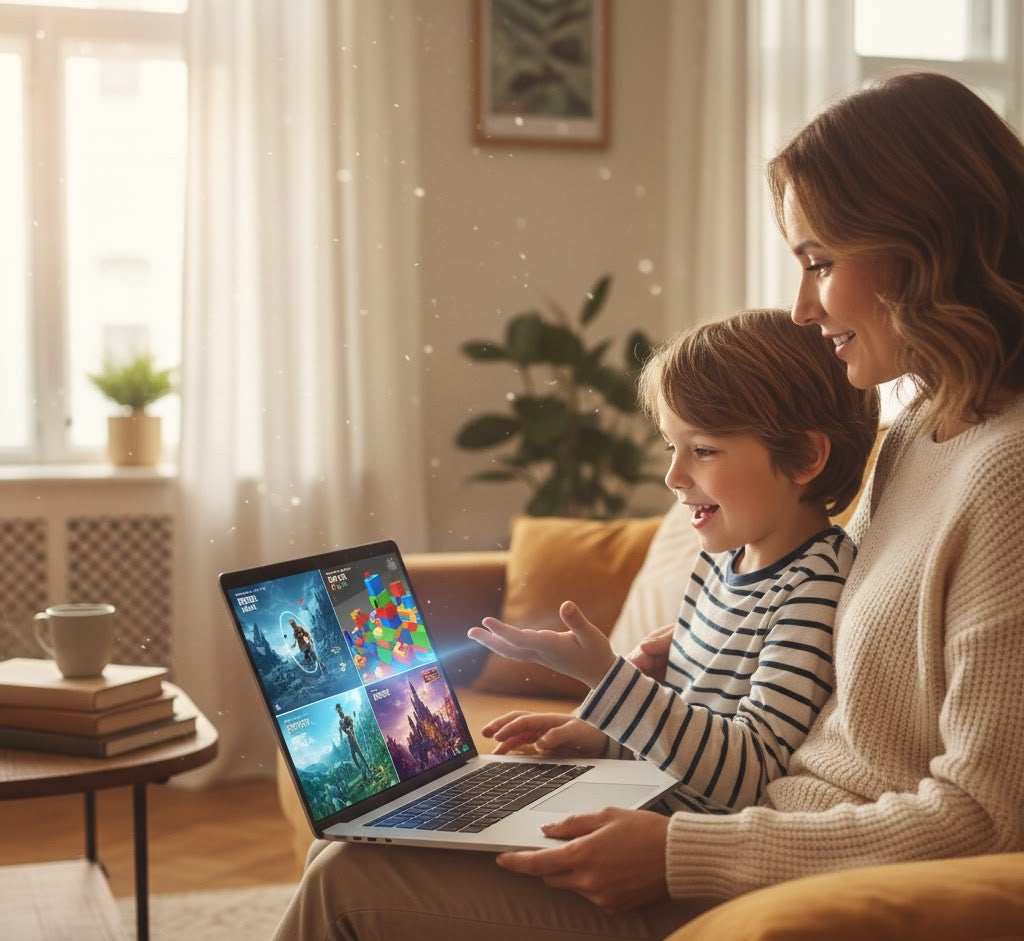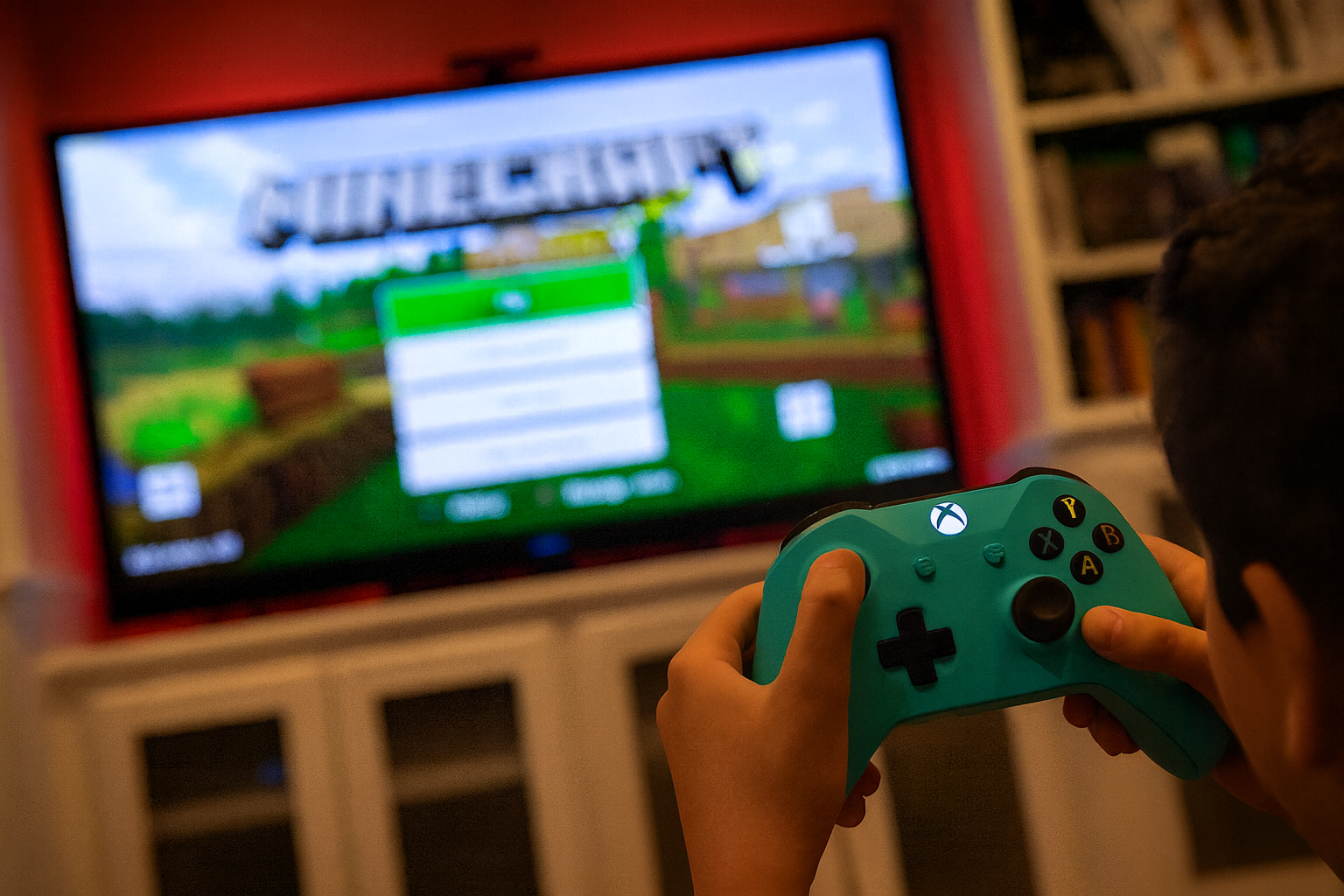7 tips on how to have great conversations about gaming with your child
Asking the right questions and having meaningful and open conversations about your child's favorite hobby is a simple but powerful way to connect with them and gain valuable insight into their gaming world.
It might not be easy for parents to do, especially if they know nothing about gaming or are not interested in gaming themselves.
Keep reading for 7 useful tips on how to have great conversations about gaming and show a genuine interest. As a bonus, scroll down to get 10 conversation starters that can help you start the conversation with your child today and learn more about your child's gaming hobby.

1. Be curious about why your child is gaming
Sometimes, when we have a child who loves gaming, we are unable to see past the time they spend on screens. We might see the activity as just more pointless screen time.
But gaming can be more than just meaningless screen time, and the interest in gaming is usually not limited to just the game itself.
There are many reasons children are drawn to video games, and not all of them are good or healthy. What motivates kids to play video games can be anything from exploring a world of creativity, social interaction, learning new skills, and being a victim of a minupulating game design, retaining the player for either marketing benefits or profit.
Remembering to stay curious and open to learn about the games your kids like will give you a much better chance at knowing if it’s a good game for your child or not, better understanding your child’s interest in gaming, and why they love it so much.
But most importantly, being curious about the video games our children play is essential for engaging in meaningful conversations about their digital hobby.
2. Understanding the gaming world
Talking about gaming can be challenging, especially for parents who may not be up-to-date on the latest trends or fully grasp the gaming terminology. Many parents haven’t experienced gaming in the same way children do today, unless they are gamers themselves.
It’s a whole new world with possibilities that older generations might not even be aware of. Exploring and solving complex tasks together with friends in what can feel like another dimension, cyberspace, is an experience many parents haven’t had or fully understand.
The types of video games kids play vary greatly. It might seem like your child is sitting passively wasting time in front of a screen, but the reality is it's not always so. They might be immersed in an adventure where anything is possible, expressing themselves creatively and interacting with friends in ways that aren’t possible in the real world. Qualities that aren’t always visible from the outside.
Given this, it’s important to stay engaged with our child’s hobby and explore what fascinates them. The best way to do this is by asking questions, listening to the answers, and playing video games together. This gives us firsthand experience of what they enjoy, and a fun shared moment that serves as a strong foundation for discussing their passions.

However, it’s crucial to recognize that some children use the virtual world as an escape, a way to avoid problems at home or school, or feelings of boredom or loneliness. Some may become so absorbed that they lose interest in the outside world and activities they once enjoyed. But in these cases, the root of the problem usually lies elsewhere in the offline world, not in the gaming itself.
Taking time to learn about the video game basics for parents, why your child loves gaming, and what risks are embedded in this hobby will give you important information about your child’s gaming passion. Knowing what’s good and bad and what to be aware of is essential when engaging in conversations about gaming.
3. Show genuine interest (or at least pretend to)
Kids need us to play an active part in their lives and show an interest in their hobbies. Even if you are not into gaming yourself, be curious for the sake of your child, and probably with time, as you learn more about what excites them, it will rub off on you. Most likely, before you know it, you will discover that you will be bonding with your child over video games.
You are not alone if you find it hard to know how to show interest in your child’s hobbies, especially the digital ones. It might feel unfamiliar at first, and it may not come naturally to check up on how a game went.
You don’t need to become a gamer yourself or master every detail of each game. You might just look over their shoulder when they play or watch a tutorial to try to understand the purpose of the game. This way, you will get a basic understanding of what gaming is and why it’s so intriguing.
As a parent, gaming can be a challenging hobby to grasp. Partly because it often happens on a screen and behind closed doors. It’s not as visually recognizable as physical sports or music. Nevertheless, being present in your child’s digital life is important. We must make an effort to understand our child’s hobby, especially since it’s something they’re passionate about and spend a lot of time on.
4. Initiate conversations about gaming
Engaging in conversation is a great way to connect with your child and their interests. However, starting the conversation can be challenging if you lack a common frame of reference. Most of us have a basic understanding of soccer or playing the guitar, which makes it easier to ask relevant questions, while it’s something completely different with online hobbies.
Many of us feel unsure about what to ask and how to come up with relevant questions when it comes to gaming. The unfortunate result is that kids will be reluctant to answer our poor attempts at asking something meaningful, and we might give up before we even start.

It’s crucial to keep trying, even if your questions are initially met with silence or deep sighs, because they sense you still don’t get what gaming is about. By making an effort, you show that you care about what your child is interested in, even if you don’t understand right away.
Eventually, it makes your child more likely to open up and share more with you, making future conversations easier. Additionally, showing interest validates your child’s hobby. It sends the message that their choices and hobbies matter, and as a result, that they matter too.
This is an incredibly important message to convey. It not only boosts your child's self-esteem, but it also makes them more likely to come to you with challenges or difficulties, both in gaming and other areas of life.
5. Join the game!
Another effective way to understand gaming is to play the game yourself. Ideally, do this together with your child, as it gives you a chance to discuss the game and everything they find exciting about it.
It might be strange at first. Should parents play video games with kids? Yes! It offers a unique opportunity for your child to introduce you to their world. It allows them to see you stepping into their realm while having fun. It’s a tremendous gift and doesn’t have to be time-consuming. One or two games are usually enough to build a basic understanding. That’s all you need, so go for it!
Yes, it can be challenging, and you might not be good at it. You may face eye-rolls. But it’s worth it. As you make the effort, you might discover what makes gaming so fascinating for your child. Joining in on the game or exploring online tutorials to learn about a game could be a unique way for you and your child to bond and connect. It can be video games that bring parents and kids together in a fun way.

6. Acknowledge the attachment to virtual reality
Many children and teenagers are passionate about gaming and spend a lot of time playing, either alone or with friends. They can become deeply attached to the world they’ve created, the character they play, or even their virtual belongings or pets. Some gamers form deep friendships with other players online, even if they have never met.
Many kids are particularly invested in virtual items such as skins, which they use to make their characters and weapons look cooler and more personalized. Kids trading skins in online games and being very consumed by this activity is common. It can be difficult for adults to understand the conflicts or challenges that can arise around these virtual items and the video game attachment in children.
Strong emotions can come into play when children feel cheated out of their pets or when they’re scammed in a trade involving skins. They may need help managing these feelings, and it’s much easier for them if the adults around them understand what’s at stake and don’t dismiss it as silly just because it doesn’t involve physical items.
By acknowledging their passion and being involved in the game, you're not only showing that you care but also opening the door to deeper conversations and a stronger bond.
So, dive in, ask questions, and maybe even pick up a controller yourself. You might be surprised at how much you both gain from the experience. After all, the best adventures are the ones we share.
Acknowledging your child's feelings about their gaming interest and emotional connection to video games will also be visible in how your comments on the game or the questions you ask will be more respectful and sincere.
This will make any conversation smoother, and your child will feel safer to share. Additionally, when your child is understood and heard, it gives you the option to respectfully challenge their attachment to the virtual world and encourage reflection on the value of digital relationships and belongings.
7. Use conversation starters
Many parents have expressed great results from using conversation starters to spark conversations around gaming with their kids. Especially conversation cards around gaming are a great way to be introduced to aspects of the gaming world that you didn’t know about.
When you get a set of conversation cards, you can feel safe that experts on children, gaming, and safety have picked out the most important conversation prompts and topics to fuel a meaningful conversation with your child about what they love about the game, to give you valuable insight into your world.
Your child feels heard and understood, and will light up from questions that are truly meaningful to them and resonate with their experience.
This way, you will also be provided with important questions about how to handle safety issues within the gaming community that you might not have thought about.
Our popular Raising Digital Citizens Kit holds 200 essential conversation starters for family discussions around children's lives online. Over ⅓ of them are about gaming and various online safety issues.
However you choose to go about it, starting the conversation today is the best thing you can do for your child and your relationship with them.
Here are 10 quick questions to get you started today and help you connect with your kids over their favorite hobby.
- Which games are your favorite? Why are they your favorite?
- Can you tell me what it’s about and show me how you play?
- Do you usually play alone or with other people?
- Who do you like to play with the most and why?
- How do you feel when you’re gaming? How does it feel after a great game?
- What are the best parts about gaming?
- What are your favorite moments when you are gaming?
- Are there times when playing a game can make you feel bad?
- When was the last time something upset you in a game or made you feel uncomfortable?
- Which game would you like to play with me?





